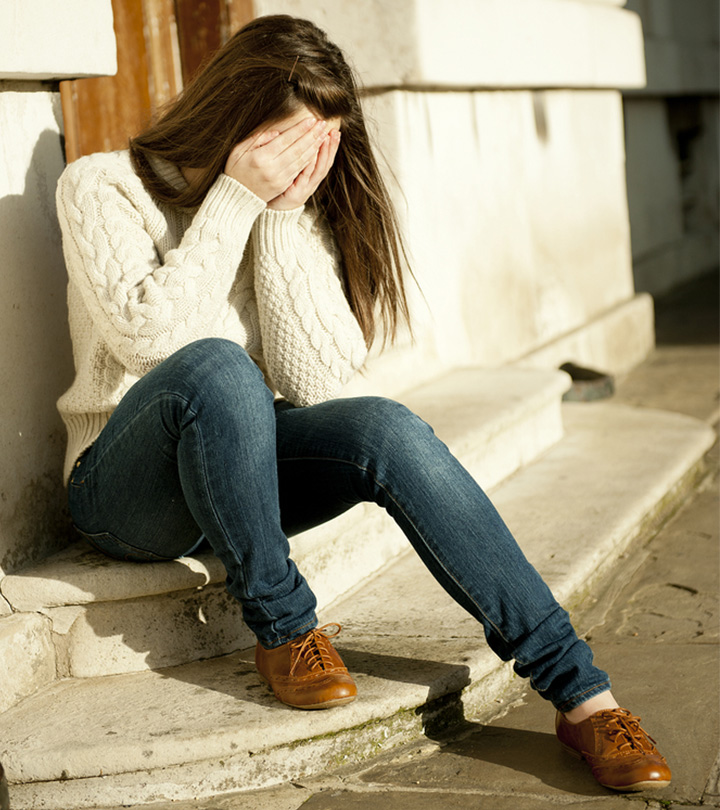Image: Shutterstock
Post-traumatic stress disorder (PTSD) is a mental health condition that can affect people of all ages. The condition is brought by a physical or emotional traumatic experience or a series of traumatic events. People affected by PTSD are troubled by disturbing thoughts, memories, and flashbacks, and associated thoughts for weeks, months, or even years after the traumatic event (1).
PTSD is more common in girls than in boys. The symptoms of PTSD in children and teens may differ from those in adults (1). Read about the causes, symptoms, risk factors, complications, and management of PTSD in teenagers.
Symptoms Of PTSD In Teens
The following symptoms may be experienced in teens with PTSD (2) (3)
Re-experiencing the trauma
- Reliving the traumatic experience, over and over again.
- Having flashbacks of the event
- Having severe nightmares
- Feeling the need to talk about the event during a conversation or play
- Despite trying hard, one cannot stop thinking about the event.
Avoiding reminders
- Avoiding any thought, object, place, or situation related to the traumatic event.
- Difficulty remembering the event details
- Becoming numb to their feelings or surroundings (coping mechanisms)
- Using drugs or alcohol to block the memories
Negative thoughts and emotions
- Feels the constant need to be “on guard” or be on edge to avoid similar situations again.
- Might get easily startled or frightened
- Problems with falling or staying asleep
- Difficulty in concentrating on schoolwork or other activities
- Having outbursts of excessive anger
- Self-harming activities
- Feeling cut off from friends and family
- Taking more risks than usual
- Constantly getting irritated, anxious, afraid, angry, ashamed, embarrassed, guilty, numb, or flat
- Losing interest in activities they previously enjoyed
- Inability to express love and affection
- Inability to distinguish between reality and dreams
- Excess fear of death of self or loved ones
- Acting younger than their age, such as bed-wetting and thumb-sucking
- Complaints such as stomachache and headache without any identifiable medical cause
Causes Of PTSD In Teens
Any teen experiencing a life-changing trauma may develop PTSD. Some common causes or experiences that may lead to PTSD in teens are (2) (4):
- Car crashes, plane crashes, or other accidents
- Natural disasters such as floods and earthquakes
- Acts of war or terrorism such as bombing
- Animal bites
- Serious medical illness or injury
- Invasive medical procedures
- Violence such as kidnapping, mugging, torture, home trespassing, and murder
- Physical, emotional, or sexual abuse of the teen or another family member in front of the teen.
- House fires
- Witnessing violence at school or home
- Suicide of a loved one
Risk Factors Of PTSD
The following factors can affect the teen’s risk for PTSD (4).
- How close the teen was to a traumatic event.
- How bad the event was
- How long the event lasted for
- If the traumatic event happened more than once
- The teen’s ability to recover from difficult things or situations
- The teen’s ability to cope with adverse conditions
- The teen’s support system
- Mental health history of the teen’s family
Diagnosis Of PTSD
A team of psychiatrists, psychologists, social workers, and other mental health experts do a comprehensive assessment by conducting interviews with the teen and primary caregivers. During these interviews, they may ask questions about the following (5).
- The traumatic event experience of the child
- The teen’s symptoms
- The teen’s medical history
- Questions about the teen’s school and social history
- The family’s medical and mental health history
The doctor will evaluate these factors thoroughly to arrive at the diagnosis of your teen’s PTSD, as most symptoms of PTSD are similar to other mental health conditions.
Treatment Of PTSD
The healthcare professionals may involve parents or caregivers to design a mutually agreeable treatment plan for teens. The treatment plan may include one or more of the following therapies (5).
1. Psychotherapy (“talk therapy”) for the teen and the family
It forms an important part of treating PTSD. It will help the teen learn coping mechanisms such as:
- Identifying the feelings of fear
- Learning self-soothing techniques to manage fear and anxiety
- Talking about the traumatic event to understand the buried events.
- Learning how to not indulge in self-blame or self-guilt when thinking about the traumatic events
- Preparing the teen on how to act or what to do if a traumatic event recurs
- Teaching them to restore trust in others and build better hope for future life
2. Medications
Anti-depressants or anti-anxiety medications may be prescribed for severe cases. The commonly prescribed medications are:
a. Anti-depressants
- SSRIs (Selective serotonin reuptake inhibitors) such as Celexa, Lexapro, Luvox, Prozac, and Zoloft,.
- Atypical anti-depressants such as Cymbalta, Desyrel, Effexor, Remeron, Serzone, and Wellbutrin.
b. Anti-anxiety medications
- Common medications are alprazolam, lorazepam, diazepam, clonazepam, diphenhydramine, hydroxizine, etc.
- Buspirone and zolpidem are less commonly prescribed medications.
Tips To Help Your Teen Cope With PTSD
The following tips can help your teen manage PTSD (4).
- Admit and acknowledge the event that happened. Do not pretend everything is normal as it won’t do any good.
- Get medical help for your teen.
- In some cases, therapy might not be needed immediately but months or years after the traumatic event.
- Inform the school, teachers, and other caregivers about the teen’s PTSD.
- You may keep in touch with other parents of children experiencing PTSD. Local community support helps you find emotional support for managing PTSD in your teenagers.
- Keep a keen eye on the symptoms of depression and suicide. Receive the treatment immediately. Every thought of suicide is considered a medical emergency.
Complications Of PTSD
The following complications may arise if PTSD in teens is left untreated (6).
- Chronic pain
- Autoimmune diseases
- Depression
- Anxiety
- Social separation, isolation, or withdrawal
- Difficulty with work or relationships
- Substance abuse or addiction
- Cardiovascular diseases
- Eating disorders
- Self -harm
- Suicidal thoughts or suicide attempt
It is unknown why some people develop PTSD and others do not. Factors such as biology and temperament play a role in the occurrence of PTSD. Preventing risks for trauma such as violence, injuries, and abuse, can protect a teen from PTSD. Early diagnosis and intervention can substantially ease the symptoms and help in the teen’s normal developmentimprove their quality of life.
References:

